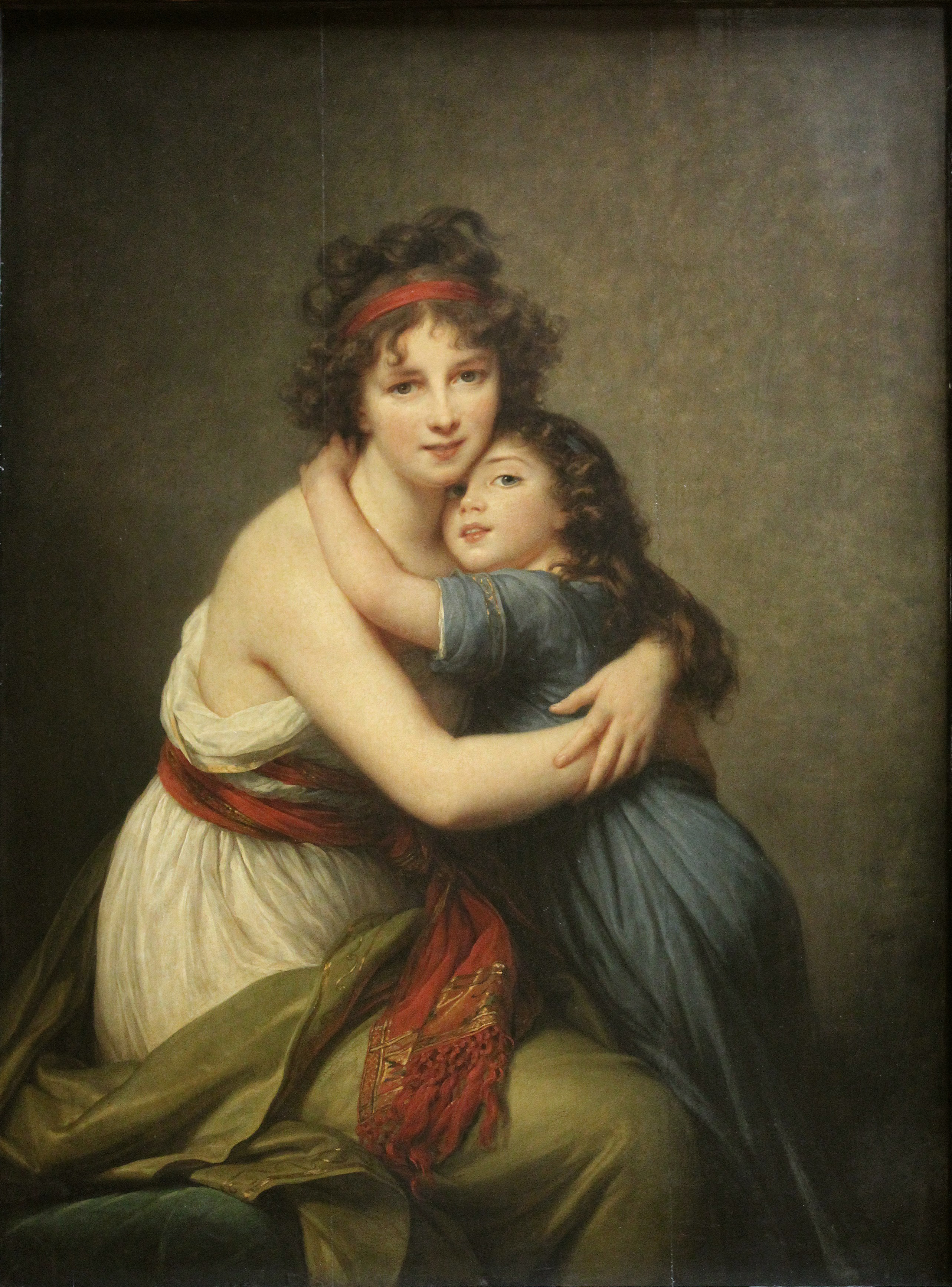
Wiki / Vertrauen
Inhaltsverzeichnis: (verbergen)

Familiäre Liebkosung von |
|
Vertrauen ist eine Oase des Herzens, die von der Karawane des Denkens nie erreicht wird. |
Das Vertrauenshormon Oxytocin
| Quelle ► Videointerview mit Prof. Gerhard Roth (1942-2023) deutscher Biologe, Verhaltensphysiologe, Hirnforscher, Universität Bremen, Autor, The difference between men's and women's brains [Der Unterschied zwischen den Gehirnen von Männern und Frauen], YouTube Film, Minute 1:11, 1:45 Minuten Dauer, eingestellt 17. Oktober 2007 |
| Referenz: ► Wissenschaftlicher Artikel von Prof. Gerhard Roth (1942-2023) deutscher Biologe, Verhaltensphysiologe, Hirnforscher, Universität Bremen, Autor, Freier Wille, Verantwortlichkeit und Schuld, PDF, präsentiert von der Berlin-Brandenburgische Akademie der Wissenschaften (BBAW), 14. März 2007 |
Amerikanische Neurologen haben an knapp 50 Probanden herausgefunden entdeckt, wie und wo sich das Gefühl des Vertrauens im Gehirn bemerkbar macht. Es wird vor allem die Hirnregion namens Nucleus caudatus aktiviert. Dort werden die Reaktionen des Gegenübers bewertet, woraus entsprechend Vertrauen oder Misstrauen folgt.
| Quelle: ► Sprachaktivierter Artikel Wo das Vertrauen wohnt. Forscher identifizieren Hirnregion, die Reaktionen anderer Menschen erkennt und kategorisiert, präsentiert von dem US-amerikanischen Wissenschaftsmagazin Science, neu aufgegelegt von der deutschen Monatszeitschrift Bild der Wissenschaft, S. 78, Ausgabe 308, 1. April 2005 |
|
|
1996 führten der US-amerikanische Neurowirtschaftswissenschaftler Dr. Paul Zak, The Center for Neuroeconomics Studies (CNS), und seine Kollegen eine internationale Vertrauensstudie durch.
"Würden Sie generell sagen, a) dass die meisten Menschen vertrauenswürdig sind?" oder b) "dass man nie zu vorsichtig sein kann im Umgang mit anderen Menschen?"
Die statistische Auswertung der Antworten ergab hinsichtlich der wirtschaftlichen Entwicklung folgende Studienergebnisse:
|
| Wirtschaftswissenschafter haben festgestellt, dass fehlendes zwischenmenschliches Vertrauen das stärkste Indiz für Armut in der Welt ist. Dies ist eine entscheidende Erkenntnis. Wir müssen nun mittels Studien erkunden, wie sich die Vertrauensbildung stärken lässt. Dr. Paul Zak (*1962) US-amerikanischer Professor für Wirtschaft und Neurologie, Neurowirtschaftsexperte, Mathematiker, Oxytocin-Forscher, Claremont Graduate Universität, The Center for Neuroeconomics Studies (CNS), Südkalifornien, Autor |
| ||||||||||||||||||||||||||
| ||||
| ||||||||
|
Im Jahr 1970 wertete Aaron Antonovsky (1923-1994) eine Erhebung über die Anpassungsfähigkeit von Frauen verschiedener ethnischer Gruppen an die Menopause aus. Eine Gruppe von Probandinnen war 1939 zwischen
In der aufwendigen Kauai-Längsschnittstudie analysierten die amerikanische Entwicklungspsychologin Emmy Werner (1929-2017) und ihre Kollegin Ruth Smith die Langzeitfolgen von prä- und perinatalen Risikobedingungen sowie die Auswirkungen ungünstiger Lebensumstände in der frühen Kindheit. Ihre Probanden, 698 polynesische Kinder, stammten aus einem kompletten Jahrgang. Sie wurden bei der Geburt und im Lebensalter von 1, 2, 10, 18, |
| |||||||||||||||||||||
| Quelle: ► John Kador, ungarisch-US-amerikanischer Autor, Effective Apology. Mending Fences, Building Bridges, and Restoring Trust [Die wirksame Entschuldigung. Zäune flicken, Brücken bauen, Vertrauen wieder gewinnen], Berrett-Koehler Publishers, 1. Mai 2009 |
| Referenz: ►Artikel Aufrichtige Entschuldigung, präsentiert von der Plattform für Schreibende Publikum, Elfriede Ammann, 15. März 2021 |
| Siehe auch: ► Ebene 30 – Schuldgefühl und ► Vergebungsmythen |
| See also: ► Extending genuine apologies to reestablish trust |
|
Wer sich entschuldigt, anerkennt mit Bedauern ein Vergehen oder Versagen. Aufrichtige Entschuldigungen richten sich auf das eigene Handeln und nicht auf die Reaktion und die Gefühle des gedemütigten Menschen. Sich zu entschuldigen, ist
Die bekannte US-amerikanische Professorin für Sozialarbeit, Scham-, Verletzlichkeits- und Empathieforscherin an der Universität Houston Dr. Brené Brown (*1965) äußerte folgenden Einsichten:
Die klinische Psychologin und Beziehungsexpertin Dr. Harriet Lerner (*1944) hat das Buch Versuch's mal mit Entschul-
Ernsthafte nachhaltige Entschuldigungen … ⚑ sind aufrichtig und direkt (nennen die Dinge beim Namen).
⚑ verzichten auf das Wort "aber".
⚑ anerkennen die vorausgegangene Schädigung.
⚑ KÖNNEN Erklärungen beinhalten.
⚑ KÖNNEN Angebote unterbreiten.
⚑ bitten nicht um Vergebung.
⚑ verzichten auf (weiteres) verletzendes Verhalten.
Die fünf Stationen einer Entschuldigung
Forscher an der Ohio State University befragten über 700 Studienteilnehmer. Aus der Studie geht hervor, dass die effektivste Entschuldigung insgesamt sechs Schritte umfasst. Die wichtigsten Elemente einer aufrichtigen Entschuldigung sind, einen Fehler einzugestehen, eine Lösung anzubieten und eine Erklärung abzugeben.
|
|
"Erst wo der Wille zur Abkehr von der Sünde auch den Willen zur Besserung einschließt, liegt eine wirkliche Bekeh- rung vor. Wo sich ein Mensch einem anderen gegenüber schuldig gemacht und Schaden angerichtet hat, kann dieser nicht allein durch Reue aus der Welt geschafft werden. Vielmehr muss der Schaden nach Möglichkeit wieder gut ge- macht werden. Soweit eine materielle Schädigung vorliegt, ist die Wiedergutmachung vor allem durch Schadenersatz zu leisten. Durch das Unrecht ist aber immer auch die Person des anderen betroffen, denn durch die Sünde ist die Liebe verletzt worden. Diese kann nur wiederhergestellt werden durch Liebeswerke, durch Bitte um Vergebung und durch Bemühen um Versöhnung. Andernfalls würde das Unrecht, selbst wenn es bereut wird, weiter bestehen und die Liebe erschwe- ren oder unmöglich machen. Die Vergebung kann allerdings nur dann ihren vollen Sinn erreichen und zur Versöhnung führen, wenn Reue und Bitte um Vergebung vorausgehen (vg. Lk 17,4). Jemandem vergeben, der sein Unrecht nicht bereut, bewirkt nicht Versöh- nung, sondern ist eher geeignet, den anderen in seinem Unrecht zu bestätigen und ihn zu neuem Unrecht zu veran- lassen. Dennoch soll der, dem Unrecht geschehen ist, nicht abwarten, bis ihn der andere zur Vergebung bittet, sondern er soll seinerseits zeigen, dass er zur Versöhnung bereit ist. Vergebung und Versöhnung unter den Menschen sind für das menschliche Miteinander unabdingbar. Die Sünde ist aber mehr als eine Verletzung zwischen menschlichen Beziehungen. Sie betrifft immer Gott selbst. Deshalb kann sie auch nur getilgt werden durch die Vergebung Gottes und seine Versöhnung mit den Menschen. Menschen dürfen und sollen einander sagen: "Ich verzeihe dir, ich vergebe dir deine Schuld!" Aber letztlich spricht das Wort der Verzeihung und der Vergebung der Schuld nur Gott (vgl. Markus 2, 7). Gottes Vergebung bewirkt nicht, dass unsere Tat unge- schehen gemacht, vergessen oder für halb so schlimm erklärt wird. Vielmehr tilgt Gott unsere Schuld, indem er sich trotz unserer bösen Tat uns zuwendet, uns mit seiner vergebenden Liebe umwandelt und uns zu Menschen macht, die mit ihm versöhnt sind." J. Prof. Dr. T. Specker, Prof. Dr. Christian W. Troll, Deutsche Bischofskonferenz, Herausgeber, Katholischer Erwachsenenkatechismus. Band II. Leben aus dem Glauben, S. 89ff, Verlag Herder, Erstauflage 16. August 2006 |
| Quelle und Referenzen, verfasst von Elfriede Ammann, präsentiert auf der kalifornischen Frage-und-Antwort Webseite Quora ► Beitrag Was ist der Unterschied zwischen verzeihen und vergeben?, 2.7k Aufrufe · 1 24. Dezember 2018 ► Beitrag Welche Vergebungsmythen sind Dir bekannt?, 481 Aufrufe · 5 Likes, 13. Mai 2019 ► Beitrag Was gehört zu einer aufrichtigen Entschuldigung, die einen Neuanfang ermöglicht?, 689 Aufrufe · 16 Likes, 19. Mai 2019 |
Persönliche Bekenntnisse
Hesses Hausbesorgerin beobachtete: Wildvögel näherten sich Hermann Hesse.
Geständnis
Student Zuckerberg in einem IM Chat bezüglich der Harvard-Studenten, die Facebook ihre Telefonnummern und Email-Addressen anvertrauen
Empfehlungen
Appelle
Schlussfolgerungen
Einsichten
Die Illusion des Geldes innerhalb eines auf Zins und Schuld basierenden Informationsgeld-Systems
Social Media erhöhen die Produktion des Schmusehormons Oxytocin und mindern Stress.
Article (engl.) Social Media Increases "Cuddle" Chemical Production in the Brain, presented by the digital media guide website Mashable, Jennifer Van Grove, 25. June 2010

|
Filmzitate
|
Ein großer Strom hat auf seiner langen Reise durch die Welt gelernt, sich immer wieder durchzusetzen. Eines Tages erreicht er die Wüste und versucht, den Sand zu durchqueren. Doch so sehr er sich bemüht, er kommt nicht voran und wird zusehends aufgeschluckt. Das verdrießt den Strom, der doch bisher jedes Hindernis übertaucht hat. Er ärgert sich und grollt: "Noch nie habe ich aufgegeben; soll ich ausgerechnet vor dem Sand kapitulieren?"
|
| Quelle: ► Idries Shah (1924-1996) persischer Lehrer der Sufitradition, spiritueller Autor, zitiert in: Elisabeth Lukas, Verlust und Gewinn – Logotherapie bei Beziehungskrisen und Abschiedsschmerz, Profil-Verlag, Edition Logotherapie, Band 5, München und Wien, 2002 |
|
Als ich mich selbst zu lieben begann, habe ich verstanden, dass ich immer und bei jeder Gelegenheit, zur richtigen Zeit am richtigen Ort bin und dass alles, was geschieht, richtig ist – von da an konnte ich ruhig sein. |
| Quelle: ► Charlie Chaplin (1889-1977) englischstämmiger Schauspieler, Filmregisseur, Rede zu seinem 70. Geburtstag, 16. April 1959, Über SELBSTLIEBE, YouTube Film, 4:00 Minuten Dauer, 11. November 2010 |
Personal avowals
Recommendations

Appeals
Conclusions
Insights
|
Countries where the level of trust in society is very low have a lot of difficulty thriving economically – so you need a certain level of trust to get moving.
Level of corruption – degree of trust
Individuation and participation in wholeness
Dorm-room IM chitchat, referring to Harvard students who trusted Facebook to keep their phone numbers and email addresses confidential.
|
Literary quotes
Distorted Tumblr generated version: "I'm not upset that you lied to me, I'm upset that from now on I can't believe you."
Movie and television series quotes
Bushism (Humor)
Poems
The Psychology of Trust in Work and Love. The science of why tit-for-tat isn’t the best strategy for cooperation and why you should hear out your hunches., presented by the free weekly digest Brain Pickings, host Maria Popova (*1984) Bulgarian critic, blogger, writer,
3. February 2014; reviewing: David DeSteno, Ph.D., US American professor of psychology, Northeastern University, author, The Truth About Trust. How It Determines Success in Life, Love, Learning, and More, Hudson Street Press, 30. January 2014

Personal avowals
Contrasting pairs of emotions, feeling states, and attitudes on the issue of trust In alphabetical order
Positive (strong) response (above 200) – Negative (weak) response (below 200)
When physiologically stressed and in "survival mode" the testosterone and its bioactive metabolite DHT are released in humans. Stress hormones prevent oxytocin from binding to brain receptors, tipping the balance towards distrust and away from pro-social behaviour.
Article Born to Be Good, presented by the US American daily newspaper The New York Times, S. 2 of 6, 189. January 2009
| See also: ► Innate goodness ⇔ innate badness |
Living one day at a time;
Enjoying one moment at a time;
Accepting hardships as the pathway to peace;
Taking, as He did, this sinful world
as it is, not as I would have it;
Trusting that He will make all things right
if I surrender to His Will;
That I may be reasonably happy in this life
and supremely happy with Him
Forever in the next.
Amen.
| Source: ► Reinhold Niebuhr (1892-1971) US American Reformed theologian, philosopher, written ~1941, cited in: Serenity Prayer |
| |||||||||||||||||||||||||||||||||||||||||||||||||||||||||||||||||
| ||||||||||||||||||||
| Source: ► Article 5 Ways Cuddling Makes Us Healthier, presented by the US American men's initiative The Good Men Project, Kate Bartolotta, 2. December 2013 |
| ||||||||||||||||||||||||||||
| Source: ► Video clip Eleven Interesting Effects of Oxytocin, presented by the removed website oxytocinfactor.com, excerpting an article by Maureen Salamon, published by MyHealthNewsDaily.com, YouTube film, 2:29 minutes duration, posted 28. February 2012 |
| References: ► Study: Social Media Increases "Cuddle" Chemical Production in the Brain, presented by the digital media guide website Mashable, Jennifer Van Grove, 25. June 2010 ► Critical article : Article One Molecule for Love, Morality, and Prosperity? Why the hype about oxytocin is dumb and dangerous, presented by the US American online magazine Slate, Ed Yong, 17. July 2012 |
| See also: ► Oxytocin – the bonding chemical ► Bonding and oxytocin enhancing behaviors to deepen the emotional connection ► Trust study on economies worldwide – Paul Zak |
|
The hypothalamus of men and women shows a significant sexual dimorphism. Only with men it is coupled with sexual arousal, aggression and dominant behavior. Predisposed men with significantly high testosterone levels and very low serotonine levels commit violent acts. Serotonine, Oxytocin, and the neuropeptide Y contribute to the calming and to aggression control.
Social media networking releases the hormone oxytocin and reduces stress.
Five ways to enhance oxytocin levels
| Source: ► Video presentation by Paul Zak, Ph.D. (*1962) US American professor of (neuro)economics and neurology, mathematician, oxytocin researcher, Claremont Graduate University, The Center for Neuroeconomics Studies (CNS), Southern California, author, Valentine's Day Tips, YouTube film, 1:10 minutes duration, posted 11. February 2009 |
More ways to enhance oxytocin levels

| References: ► Blog article by Marnia Robinson, US American former corporate lawyer, researcher, author on ancient sacred-sex prescriptions, The Lazy Way to Stay in Love, presented by removed website reuniting.info, 17. June 2008 ► Blog article Studies expand oxytocin's role beyond 'cuddle hormone' , presented by the removed website reuniting.info, Gary Wilson, US American science teacher, 15. November 2010 |
|
In 1996, neuroscientist and neuroeconomist Paul Zak, Ph.D. and his colleagues performed an international trust study.
Participants in different countries were asked the following question:
Conclusions of the statistical analysis of the study results in regard to the factor of trust in economic development:
TRUST
For every 15% increase in the trust level of a nation's citizens, their economic fortunes rise by $430.
| Source: ► Article featuring Paul Zak, Ph.D. (*1962) US American professor of (neuro)economics and neurology, mathematician, oxytocin researcher, Claremont Graduate University, The Center for Neuroeconomics Studies (CNS), Southern California, author, The Neurobiology of Trust, presented by the US American popular science magazine Scientific American, June 2008 "Economists have uncovered that interpersonal trust is among the most powerful predictors of whether or not a country will be "rich"." |
| Reference: ► Article Oxytocin: Trust, Touch and the Economy, presented by the mindpowermasters.blogspot, Brian Sullivan, June 2009 |
|
"When parents are stressed, they're less able to attune to their kids. The less able they're to attune to their kids the more likely
their children's brains will not develop optimally." Minute 27:16 ||
|
|
|
| |||||||||||||||||||||||||||||||||||||||||||||
| Source: ► Deleted article by Dr. Ellie Drake, Iranian success speaker, Women Empowerment – Are You Tapping Into Your Prosperity Hormone?, presented by articlesnatch.com, 8. October 2010 | ||||||
|
| See also: ► Jen science on humanity – Dacher Keltner |
|
| ||||||||||||||||||||||||||||||||||||||||||||
| ||||||||||||||||||||||||||||||||||||||||||||
| Sources featuring Mario Martinez, PsyD, Uruguaian clinical neuropsychologist, contemplative psychologist, psycho-neuroimmunologist, author ► Audio interview Mind Body Code, presented by the US American radio broadcasting company CBS Radio (2005-2017), host KG Stiles, YouTube film, 9:59 minutes duration, aired 20. April 2010 ► Video presentation Embodying The Four Immeasurables, YouTube film, 1:48:40 duration, posted 22. July 2011 ► Audio interview How the Mind Wounds & Heals the Body, presented by the US American radio broadcasting company CBS Radio (2005-2017), host KG Stiles, YouTube film, 21:46 minutes duration, aired 14. November 2012 ► Audio presentation The Covenant of Safety, podcast MP3, presented by the US American multimedia publishing company Sounds True, Insights at the Edge, host Tami Simon (*1953) US American founder and director of Sounds True, 10:21 minutes duration, aired 31. November 2012 ► Audio interview Dr Mario Martinez, neuropsychologist, on his book: The Mind Body Code, presented by the YouTube platform "A Better World TV", host Mitchell J. Rabin, 1:32:49 duration, posted 6. March 2019 |
| ||||||||||||||||||||||||||||||||||||||||||||||||||||||||||||||||||||||||||
|
| ||||||||||||||||||||||||||||||||||||||||||||||||||||||||||||||||||||||||||||||||||||||||||||||||||||||||||||||||||||||||||||||||||||||||||||||||||||||||||||||||||||||||
|
Study results on three distinct emotion-motivation systems (drives) governing mammalian mating behavior Mammals and birds have evolved three primary, discrete, interrelated emotion-motivation systems in the brain for mating, reproduction, and parenting: lust, attraction, and male-female attachment. Each emotion-motivation system is associated with a specific constellation of neural correlates and a distinct behavioral repertoire.
The evolution of these three emotion-motivation systems contribute to contemporary patterns of marriage, adultery, divorce, remarriage, stalking, homicide and other crimes of passion, and clinical depression due to romantic rejection.
Abstract by Helen Fisher, Ph.D. (1945-2024), A. Aron, D. Mashek, H. Li, L.L. Brown, Defining the brain systems of lust, romantic attraction, and attachment, archived by the free MEDLINE database PubMed, published by the peer-reviewed academic journal in sexology Archives of Sexual Behavior, volume 31, issue 5, S. 413-419, October 2002 |
| Sources on Fisher's thesis on Sex drive, Romantic love, Longterm attachment featuring Helen Fisher, Ph.D. (1945-2024) Canadian-American research professor of biological anthropology and human behavior, Center for Human Evolutionary Studies, Rutgers University, expert on romantic interpersonal attraction, chief scientific adviser to Chemistry.com, author ► Deleted video interview Why We Love: The Nature and Chemistry of Romantic Love, presented by The Science Network (TSN), host Roger Bingham, location "The Book Works," Del Mar, California, 43:00 minutes duration, 8. June 2006 ► Video presentation Helen Fisher tells us why we love and cheat, presented by TED Talks, Vimeo film, 23:29 minutes duration, filmed February 2006, posted March 2012 ► Video presentation The brain in love, presented by TED Talks 2006, 15:56 minutes duration, filmed February 2008, posted July 2008 |
| See also: ► Four major biological love types – Helen Fisher and ► Correlated typology chart ► Lao Tzu and ► Tao and ► Principle 3:1 and ► Marriage and ► Integration |
| See also – Spiritual bonding: ► Three Daoist types of Yin ∞ Yang integration and sacred sexuality excerpted from the Daoist Hua Hu Ching, ~300 CE ► Quotes on Karezza |
| Siehe auch: ► Biologie der drei grundlegenden menschlichen Paarungstriebe |
|
|
|
| |||||||||||||||||||||||||||||||||||||
| Source: ► ⚡ Dr. David R. Hawkins, predominantly Transcending the Levels of Consciousness. The Stairway to Enlightenment, 2006 |
| |||||||||||||||||||||||||||||||
| Inspired by: ► ⚡ Dr. David R. Hawkins, Truth vs. Falsehood. How to Tell the Difference, S. 45, 2005 |
| See also: ► Scale of consciousness and ► Tables |
| Siehe auch: ► Vier Entwicklunggsstadien der menschlichen Erfahrung – D. Hawkins |
|
| Source: ► Leslie Temple Thurston, South African American consciousness shifter, spiritual teacher, Brad Laughlin, Returning to Oneness. The Seven Keys of Ascension, CoreLight Publications, September 2002 | ||||
| See also: ► Transcending | ||||
|
|
| ||||||||||||||||||||||||||||||||||
| Source: ► Researchers at Ohio State University Roy J. Lewicki, Beth Polin, Robert B. Lount, An Exploration of the Structure of Effective Apologies, presented by the magazine Negotiation and Conflict Management Research (NCMR), volume 9, issue 2, published online 6. April 2016 |
| See also: ► Responsibility and ► Recontextualization and ► Forgiveness |
| |||||||||||||||||||||||
| Source: ► John Kador, Hungarian US American author, Effective Apology. Mending Fences, Building Bridges, and Restoring Trust, Berrett-Koehler Publishers, 1. May 2009 |
| Siehe auch: ► Verlorenes Vertrauen durch aufrichtiges Aussöhnen zurückgewinnen |
| |||||||||||||||||||||
| Reference: ► Blog article How to write a damn good apology, presented by the stories outlet Medium, Lauren Holliday, 13. July 2016 |
| See also: ► Dignity |
|
| References: ► Book Gary Chapman (*1938) US American, anthropologist, philosopher, Baptist pastor, religious instructor, speaker, author, Jennifer Thomas, The Five Languages of Apology, Nan Fang Chu Ban She, paperback, 1. September 2007 ► Article The 6 elements of an effective apology, as shown by one of the best apology songs ever., presented by the website for viral content Upworthy, James Gaines, 22. April 2016 ► Video presentation by Aaron Lazare (1936-2015) US American professor of psychiatry, chancellor and dean of University of Massa- chusetts Medical School, Worcester, Massachusetts (1991-2007), author, Aaron Lazare: On Apology, presented by the public media service WGBH Forum Network, Lowell Institute, YouTube film, 1:17:19 duration, posted 27. May 2014 ► Video presentation by Robert M. Gordon, Ph.D., US American forensic psychologist, psychoanalyst, psychodynamic researcher, The power of the apology, presented by TEDxLehighRiver, YouTube film, 16:43 minutes duration, posted 12. November 2014 ► Video presentation by Gary Chapman (*1938) US American, anthropologist, philosopher, Baptist pastor, religious instructor, speaker, author, The Five Languages of Apology, sponsored by Wheaton College, Winston-Salem, North Carolina, 13. November 2013, YouTube film, 26:55 minutes duration, posted 24. April 2015 |
| See also: ► Quotes on narcissism – Sam Vaknin |
Links zum Thema Vertrauen / TrustLiteratur
Literature (engl.)
Book reviews
► 70% of normal couples have sexual desire problems.
► Primary thesis: Oxytocin is a key hormone in the development of moral behavior in man.
Review: The Psychology of Trust in Work and Love. The science of why tit-for-tat isn’t the best strategy for cooperation and why you should hear out your hunches., presented by the free weekly digest Brain Pickings, host Maria Popova (*1984) Bulgarian critic, blogger, writer, Externe Weblinks
Dacher Keltner stellt in seinem Buch Born to Be Good ein Menschenbild der Fürsorglichkeit vor. Menschen mit einem relativ hohen Vagusnervtonus haben mehr Freunde und soziale Kontakte, sind hilfsbereit und zeigen viel Mitgefühl. Der Vagusnerv ist mit Rezeptoren verknüpft, die das Vertrauenshormon Oxytocin binden.
Links zum Thema Vertrauen – QuoraBeiträge verfasst von Elfriede Ammann, präsentiert auf der kalifornischen Frage-und-Antwort Webseite Quora DE
External web links (engl.)
Trust is essential to couples and communities and how it can be built
Linkless articles
Audio- und Videolinks
Audio and video links (engl.)
The so-called "cuddle hormone", oxytocin, increases generosity and trust. A new study shows it can improve a specific kind of memory.
Audio and video links (engl.) – Paul ZakAudios and videos on healing masculinity featuring Paul Zak, Ph.D. (*1962) US American professor of (neuro)economics and neurology, mathematician, oxytocin researcher, Claremont Graduate University, The Center for Neuroeconomics Studies (CNS), Southern California, author
| ||||||||||||||||||||||||||||||||||||||||||||||||||||||||||||||||||||||||||||||||||||||||||||||||||||||||||||||||||||||||||||||||||||||||||||||||||||||||||||||||||||||||||||||||||||||||||||||||
Englisch Wiki
Hawkins
1 Offenbarung 9, 18 (NT) ⇑
2 [D]as Leiden, das durch eine schlechte Handlung gesetzt wurde, lässt sich immer noch durch eine rechte Handlung wiedergutmachen, und solche Wiedergutmachung nennt man bekanntlich Sühne. Wie ist es aber dann bestellt, wenn etwas nicht wieder gut zu machen ist, zumindest nicht im Sinne von Sühne, also nicht durch eine rechte Handlung? Dann kommt es nur umso mehr auf die rechte Haltung an, auf die richtige Einstellung, jetzt aber nicht gegenüber dem Leid an sich und als solchem, vielmehr gegenüber der Schuld. Und die rechte Haltung gegenüber der eigenen Schuld ist die Reue. Viktor E. Frankl (1905-1997) österreichischer Psychiater, Psychotherapeut, Neurologe, KZ-Überlebender, Sinnforscher, Begründer der Logotherapie, Autor, Logotherapie und Existenzanalyse. Texte aus sechs Jahrzehnten, S. 131-132, Beltz, 3. Taschenbuchauflage
19. Juli 2010 ⇑
3 Allgemeine Abneigung gegen Menschen, Misstrauen, Abscheu, Geringschätzung, Hass auf Menschen und die menschliche Natur ⇑
4 Published by the US American scientific journal Psychological Review ⇑
5 Income and status gap in 23 of the rich developed countries worldwide – Wilkinson und Pickett ⇑
6 Stephen Porges, Ph.D., Social Engagement and Attachment, 2003 ⇑
7 Polyvagal Theory – three phylogenetically ordered neural circuits regulating autonomic nervous system. The newest circuit reflects unique face-heart connections which form a functional "social engagement system" involving an integrated regulation in the brainstem of the striated muscles of the face and head with a mammalian myelinated vagus that proposes older vagal circuitry involved in death feigning and shutting down behaviors that response to life-threat or panic. ⇑
8 "Neural substrates underlying fear-evoked freezing: the periaqueductal grey – cerebellar link", presented by the biweekly peer-reviewed scientific journal The Journal of Physiology, 2014 ⇑
9 Stephen Porges, Ph.D., Polyvagal Theory ⇑
10 Deleted scholarly article by Margaret Heffernan, Women stereotypes at work, [Pretty geisha, Working invisible woman, Respected bitch, Successful guy], BNETvideo, 2. August 2010 ⇑
11 First studied and published by Shelley Elizabeth Taylor, Ph.D. (*1946) US American professor of psychology, University of California, Los Angeles, 2000
Recent study by researchers: Angeliki Theodoridou, Angela C. Rowea, Ian S. Penton-Voaka, Peter J. Rogers, Oxytocin and social perception. Oxytocin increases perceived facial trustworthiness and attractiveness, department of experimental psychology, University of Bristol, United Kingdom, archived by the free MEDLINE database PubMed, accepted 23. March 2009, June 2009 ⇑
12 Presented by the Psychological Review ⇑
14 This spiritual-energery etheric brain identifies with context rather than content. Dr. David R. Hawkins, Discovery of the Presence of God. Devotional Nonduality, S. 115, 2007 ⇑
15 The etheric brain activates the energy within the neurons. Consciousness creates neuronal activity. Dr. David R. Hawkins, Sedona seminar unnamed, date unknown ⇑
16 Spiritual intention changes the brain's physiology – spiritually oriented people experience things differently than "ordinary" people. The change occurs in the prefrontal cortex, creating an "etheric brain." (Calibrated as a fact.) [The etheric brain does not exist in individuals below 200 LoC.] The shift above LoC 200 speeds up karma. […] Rapid pathway bypasses the emotional centers of the brain. The majority of Homo sapiens do not have an etheric brain. The new species of individuals calibrating over 200 is "homo spiritus." Under 200, the left brain is dominant and individuals are more prone to disease, depression, addiction, and rage. Dr. David R. Hawkins, Sedona Seminar Realization of the Self and the "I", 3 DVD set, 1. November 2003 ⇑
17 One profound consequence of the emergence of an etheric brain is its survival of a physical death and the accumulation of karmic patterns. Dr. David R. Hawkins, Truth vs. Falsehood. How to Tell the Difference, S. 68, 2005 ⇑
18 Arthur Aron, Helen Fisher, Debra J. Mashek, Greg Strong, Haifang Li, and Lucy L. Brown, "Reward, Motivation, and Emotion Systems Associated With Early-Stage Intense Romantic Love", presented by the monthly peer-reviewed scientific journal Journal of Neurophysiology, S. 327-337, volume 94, issue 1, May 2005 ⇑
19 Four-stroke cycles of generations – Strauss and Howe ⇑
20 Genesis 1, 22 (OT) ⇑
21 Matthew 5, 48 (NT) ⇑
22 Audio interview Why Won't Donald Trump Apologize and More, presented by The Halli Casser-Jayne Show, host Halli Casser-Jayne, minute 40:36, 58:14 minutes duration, posted 11. January 2017 ⇑
23 Video presentation Why Won't He Apologize?, presented by TEDxKC Talks, Union Station, 29. April 2016, YouTube film, minute 10:15 and 10:44,
13:02 minutes duration, posted 21. October 2016 ⇑